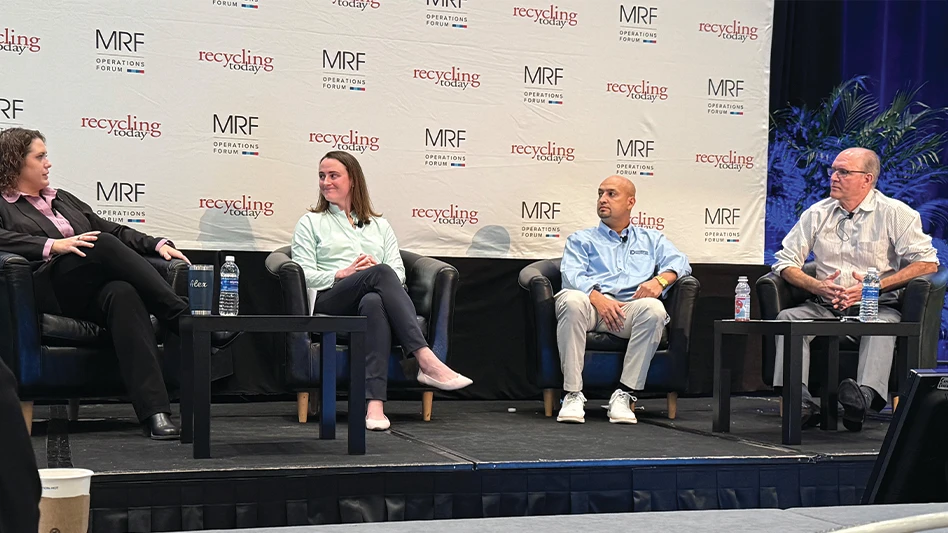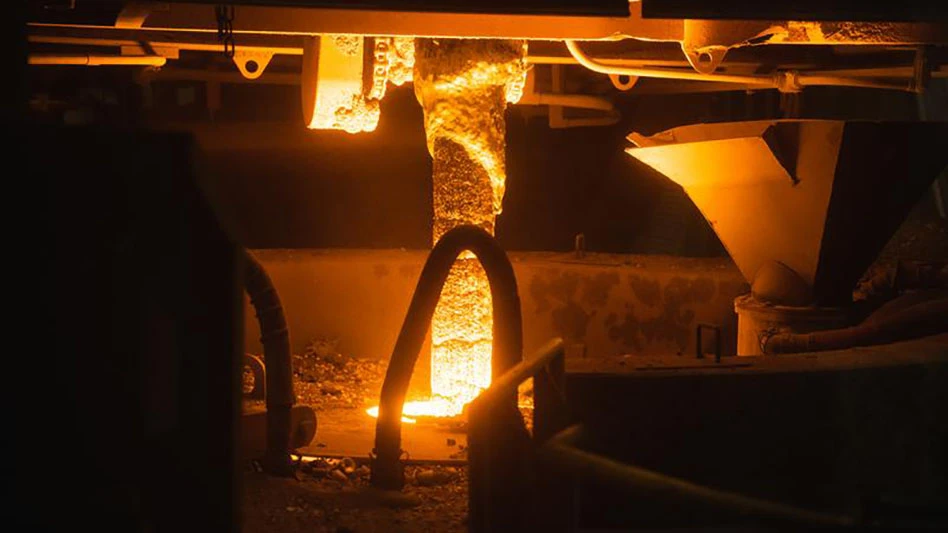Stories of scrap theft incidents usually turn out to be comical, absurd and downright ridiculous. But as funny as some of the stories are after the fact, scrap theft is nothing to laugh about because it continues to happen, and it continues to cost processors money.
Just as dealers have to careful about material leaving their own yards illegally, they also need to be on the alert to keep from accidentally buying stolen material.
"A good scrap dealer becomes a good watchdog," says Joel Denbo, vice president of Denbo Iron & Metal Co., Decatur, Ala., and chairman of the manufacturing and technology committee for the Institute of Scrap Recycling Industries, Washington. "Not only do you have to guard against material being stolen from your own business, but you have to look out for material coming from other yards, and items that are suspect from other sources," he says.
Although dealers can’t be sure about every shipment of scrap to their facilities and they can’t inspect every load with 100 percent thoroughness, there are actions a dealer can take to minimize both his own loss, and the loss of material from other yards, businesses and public property.
TALES OF THEFT
It seems that most scrap dealers have at least one crazy story to tell about scrap theft, and most revolve around peddlers trying to unload stolen property at their yards. Denbo had several incidents to share.
"One day, a peddler showed up with 500 brass urns," says Denbo. "And we had him unload them in our yard. Once they were unloaded, we asked him for a written statement of release from where he obtained the urns. But he could not deliver one. We weren’t going to pay him until we saw the paperwork; and we weren’t going to load them back on his truck either – so we knew we had him. After checking around at the local cemeteries, we finally found where they came from and that the urns, indeed, were stolen."
Another incident involved Denbo and his father-in-law, who owns a scrap operation nearby. According to Denbo, his father-in-law has a copper briquetting operation, and the bricks are imprinted with the initial of his last name. One day, Denbo received a call from his father-in-law saying he had several copper bricks stolen from his yard. "Well, sure enough, soon after I received that call, here comes a guy strutting into our yard, with a copper brick slung over each shoulder, and the imprinted initial facing forward," says Denbo. "Now, that’s pretty stupid. Funny, but stupid. We bought the bricks, then called the police."
Scavenging can take place on any level. One recycler was helping a local student organization collect aluminum cans for money. The program was working well until he received a call from another collection company saying the same students were removing cans from his collection bins throughout the city.
In Cleveland, the hallowed Soldiers and Sailors Monument on the city’s square was defaced last year when someone began pulling off brass and copper trim that was bolted down.
Larry Snyder, vice president of nonferrous for Cozzi Iron & Metal, Chicago, previously worked for a scrap company in Wisconsin, and had this story to tell. "One day these peddlers showed up with cut wire," he says. "Well, we found out that they had gone into a farmer’s field and taken out the power line to his irrigation system – they removed more than 3 miles of cable! When the farmer went to turn on his irrigation system, he had a big surprise."
Red Malone of Brookfield Metal Co., Elmsford, N.Y., says that he is seeing a lot of theft from railroads.
"Railroad scrap and replacement spikes and track are usually left by the side of the track to be picked up later by railroad personnel. Scavengers routinely target that stuff because it is just laying there."
The city of Newark, N.J., has had a continuing problem with scavengers and peddlers trying to get cash for stolen materials. When recyclable material was being taken off residential curbsides, and metal telephone poles and manhole covers began to show up missing, the city finally instituted an ordinance that made illegal scavenging a crime punishable by fines of up to $1,000 for repeat offenders and up to 90 days of community service.
BE ON THE ALERT
The best attitude that a scrap dealer can have is to always be on the alert for stolen material, and to be mindful of in-house operations. Some facilities insist their employees go through metal detectors after work each day, but this may not always be necessary. "I am not saying that you should not trust your employees, but when scrap prices start rising, your workers are the first to know, and sometimes it can get tempting," says Denbo.
It also goes without saying to use common sense and judgement when dealing with peddlers. "You don’t want to go around suspecting and accusing everyone who delivers scrap to your doorstep," he says, "but you don’t want to be oblivious, either."
Denbo recommends that if a peddler is suspect, to either flatly turn him away, or try to obtain more information, and definitely documentation. "Many times we will go ahead and even pay for the stolen material, then immediately call the police and the company we think it was stolen from," says Denbo. "Then they can go after the peddler and retrieve our money."
The Southeast Chapter of ISRI has a fax net that is used to notify other scrap dealers in the region of suspected peddlers and stolen material. "The fax net has yielded some results in the past, but it is not an end all solution," says Denbo.
There is also a fax net in the Cleveland area. "We receive faxes just about everyday from the police department alerting us to stolen material," says Stuart Simms, vice president and chief operating officer of The Parkwood Iron & Metal Co., Cleveland. "Every scrap yard in the city is required to have a fax machine for this purpose. But the faxes have to be timely in order to be effective. We received a fax once about stolen material, but had already accepted it not knowing it was stolen. We called the police about it, and the material was returned to the rightful owner."
Denbo also recommends that a dealer stay in touch and develop a "gentleman’s agreement" with the local police department and various manufacturing companies in the dealer’s immediate area that use or handle metals on a frequent basis.
"If there is a company that handles copper wire nearby, you shouldn’t have peddlers trying to drop off spools of the stuff at your place of business," he says. "So, you have to be aware of your surroundings and stay in touch with those companies." Usually a peddler will not travel long distances with large quantities of stolen material, so material is normally panned off in the area from which it was stolen.
Denbo’s company, for instance, won’t even accept highline green wire unless it is from a contractor. "That type of wire is not suppose to be in anyone’s hands but a contractor, and if a peddler shows up in a beat-up pickup truck trying to get money for it, then it’s probably stolen," he says.
Scrap processors should also be especially critical of items that are still usable. "One day I received a call from a local grocery store that had the aluminum dock plate stolen from its premise," says Denbo. "Sure enough, soon after I received the call, here it comes through our front gate on the bed of a peddler’s truck."
TAG AND HOLD
One measure that has been implemented by the city of Cleveland is a "tag and hold" ordinance that requires scrap yards to label and hold certain materials for a period of time. "The ordinance requires us to hold items that would normally be suspect as stolen," says Simms. "These are items such as #1 and #2 copper; street signs, railroad scrap; placards; and processed scrap," he says. "When accepting these types of items we have to obtain additional documentation and identification from the peddler."
But the ordinance was originally designed to be much stricter than its current version, according to Simms, who by chance read about the proposed ordinance in the daily paper. "I saw this small news article that indicated a tag and hold law was to be enacted, and that was the first I or anyone else had heard of it," he says. "Immediately, I called some city officials and some other dealers and approached the city council on this matter. Keep in mind that the ordinance had only one more committee to pass through before the mayor was going to sign it into law. Well, we had a pretty heated discussion with the police and representatives from the utility companies – they were the ones who initiated the law because they were having so much wire stolen. But no one had contacted us, the scrap dealers, about the ordinance, and as it stood, it would have restricted everything we bought and would have really been a detriment to recycling in Cleveland."
As it turned out, the ordinance was extensively modified so that it would not impede the everyday operations of the scrap business in the city. "We keep a book on all of our peddlers and they all have an assigned number," says Simms. "So there is a running record of what they delivered. The ordinance went into effect in 1992, and to date, we have not had the police check our record once, but it is there. We have never had an inspection due to the ordinance and I think that is because the police know we do not accept suspect material and have a solid track record in that area."
Denbo is leery of any type of tag and hold ordinance. "It is just not feasible for us,’ he says. "We move material out of here fairly fast, and for us to hold on to it when a mill needs it, is just not going to work."
Most of the tag and hold laws that have been enacted throughout the United States are local ordinances that have been established due to unusually high incidents of metal theft. "I would say that these laws are not very prevalent through the country," says Scott Horne, director of state and local programs for ISRI, "but there are some out there. Most of them, however, are not practical because they are missing important parts."
Horne simply recommends that dealers be as vigilant as possible, and get coverage to protect against any losses. "For ISRI members we have conversion coverage through our CNA-sponsored insurance program that will protect dealers against any losses due to theft," he says. "And it also covers the dealer for losses incurred if stolen material that is peddled in has to be returned, and the payment for that material cannot be recovered."
The city of Newark has not only begun cracking down on illegal peddling of scrap, it is also investigating yards that are accepting stolen materials.
Denbo is careful when he talks about cracking down on the illegal transfer of material. "We are not the culprit here," he says. "We cannot inspect every load, every time at 100 percent – that’s impossible. So, stolen material does make it through. Many times it is very difficult to determine what is stolen material and what isn’t."
Robert Abel, commodity purchasing agent for Kaiser Aluminum, Heath, Ohio, agrees that every load cannot be thoroughly inspected, but says there should be a comprehensive inspection process in place that will eventually weed out those who are not reputable peddlers.
"Most of the corrupt peddlers are small-time ones," says Snyder. "These are peddlers that usually deliver less than 1,000 pounds of material. One way we discourage illegal scavenging is by paying by check only. That way the person is more easily traceable if a problem arises."
But Denbo won’t exonerate all scrap dealers, either. "We have scrap dealers and processors who are involved in the trade associations, and who are conscientious and responsible people. Then there are those operations that will buy anything, and who do not make the effort to determine if the scrap they are receiving is stolen. We need to bring these people into the loop."
Another problem is scrap theft from the yards themselves. To combat theft here, dealers recommend the basics: fence all areas and wired all gates to a security system. More valuable material, mainly nonferrous metals, should be under additional lock and key. All scrap yards should be well lit, as well.
Overall, Denbo feels that the scrap theft problem is more of a nuisance than a real problem. "Ninety-nine percent of the people who deliver material to us are honorable," he says. "And you know who those people are. It’s the other 1 percent that makes life difficult for us."
Simms agrees, adding on behalf of the scrap industry, "we want to be part of the solution, not part of the problem."
The author is managing editor of
Recycling Today.
Explore the June 1996 Issue
Check out more from this issue and find your next story to read.
Latest from Recycling Today
- AF&PA releases 2023 paper recycling rate, unveils new methodology
- ARA names new president
- Aurubis invests in Lünen, Germany, site
- ILA, USMX negotiations break down
- Van Dyk hires plastics industry vet to expand footprint in PRF sector
- Li-Cycle closes $475M loan with DOE
- Report highlights consumer knowledge gaps in lithium battery recycling
- AMP names CEO





